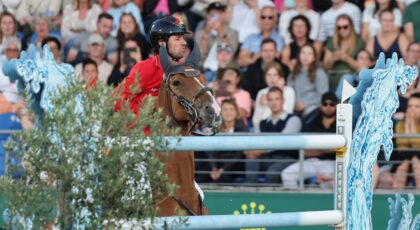Trigger warning: This story discusses personal reflections on rape and sexual assault.
When I was 10, I fell off a horse for one of the first times.
She didn’t do anything wrong, other than stumble at the canter, but I went down hard. The next thing I remember is sitting in the backseat as my mom rushed me to the hospital, a limp hand hanging from a cracked wrist on my left arm.
Thus began the next four or so years of desperately trying to regain an ounce of confidence in the saddle. What I now understand as some form of post-traumatic stress felt a lot like just sucking at the sport I loved as an 11-year-old.
Most of my trainers didn’t understand that I was a terrified kid, not a bad one. You can’t blame them, really—most of them had no training in child development or education. They were exceptional athletes, but the numbers of wins under their belts didn’t prepare them for a kid who’s shaking and crying because you asked them to go canter.
One trainer, though, walked with me. When I was too scared to trot all alone, he’d jog next to the lesson horse. He would never get angry or frustrated. He knew I was a kid, and I was scared.
And so I got better.
He was patient with my fear. When I couldn’t do it alone, he walked with me. By the time I was 14, he had stopped training to be a full-time theatre professor at a local university, and I was mostly doing better. I’ve been an anxious rider ever since and probably always will be, but I could push through. It was my first encounter with what I would later learn was an endless reserve of resilience.
I got a green, four-year-old, 18-hand gelding named Elvis when I was 15 (brilliant, right?). He would occasionally decide that the in-gate looked way better than moving off my leg and catapult sideways, or throw a buck for seemingly no reason. But really, he wasn’t that naughty.
Still, sometimes when I got on, I was the little 11-year-old girl again. You know that cliché, “courage is being scared to death and saddling up anyway”? I lived that.
Thanks to a couple of tough trainers who always pushed me just enough, who never made me admit I was scared, and who believed I could do it even though I was scared, I persevered. Elvis had a fabulous two seasons of showing in the Children’s Hunters and Equitation before suffering a career-ending injury.
When your horse is hurt and you have absolutely no idea why, it takes a lot of resilience to figure it the hell out. Six months of vet visits, trailering from Chicago to Ohio State and other renowned clinics, finally got us the answer we needed. Then a senior in high school, my entire last junior year wasn’t spent showing but worrying—and persevering.
Something I struggle to articulate to my non-equestrian friends and family is that riding truly forces you to be resilient in ways I don’t believe anything else does.
Being responsible not only for yourself but for your horse, who is entirely dependent on you, with every decision you make forces a level of responsibility, maturity, and thought that few other activities do. Not only can your horse consciously choose to do you harm in a way no other “equipment” can, but if you mess up badly, you aren’t just risking yourself—you’re risking the animal you love most.
Equestrians are human, so of course we mess up.
We mess up and we fall off and we break ourselves. We don’t see our distance and we put our horse on a half-stride and they receive the consequence. When you mess up, there’s a layer of guilt. You’ve disappointed your coach, you’re scared of “ruining” your horse, and you can even hurt the animal if you mess up badly enough. It takes a tough kid to push through that.
I credit riding with giving me the qualities I love most about myself—I’m soft and tough, I’m gritty and flexible, I’m empathetic and resilient. So when I was raped when I was 19, I had the tools I needed to survive.
Nothing can prepare you for the utter betrayal of being raped, especially by someone you thought you knew. And, listen, I’m dramatic, so I literally walked into the sea at one point, like the siren myths were true. I wasn’t prepared to be raped. But I had the resilience I needed to survive.
Horses did that for me. Every stupid spook, buck, bolt, and rear I lived through gave me another ounce of courage, which, when combined, created a surprisingly tough 19-year-old. Eleven-year-old Madison’s abject terror at the idea of cantering, 12-, 13-, 14-year-old Madison’s determination not to give up, all those tiny pieces poured into a stronger foundation of resilience than I think anyone expected.
In the months and years that followed, I was doing exactly as well as you’d expect, which is to say I was doing really terribly.
I had to drop out of my university’s prestigious business school to pursue a less strenuous degree. I lashed out and I wasn’t always a good friend and I used sexual attention from men to try to convince myself that I was in control of the situation.
But I had brought Elvis to school with me, and on dark Indiana autumn nights, I would plop myself in my car and head out to the barn at all hours of the night (thanks to my trainer for letting me!). It kept me from drinking, or worse.
My horse, again, was what bolstered my resilience. Being able to spend time with another living thing and just be took my mind off of everything in my life that felt like it was caving in around me. He was frequently the reason I didn’t just wrap my car around one of the big trees on the drive out to the barn. When everything I believed about the goodness of the world was called into question, he was the lighthouse that reminded me goodness was out there.
The foundation of resilience horses had given me was rocked, but not cracked. And Elvis poured into it again.
When I gathered the courage to try to do something, anything, to keep other girls from suffering like I was, it was that resilience that gave me the courage to advocate for others in a big way, both in college and now in my career. The way I fought back left a mark that will hopefully keep other women in my position safe.
In the time since I was raped, Elvis hasn’t just rebuilt my foundation of resilience; he’s added to it. When I moved to France, so did the horse I rode there, Takino. When I moved to Wyoming to be a wrangler, so did Colonel and Onyx. And now, in Ocala, so does Sushi.
We can’t choose what happens to us. Ten-year-old me didn’t choose to break her wrist, and 11-, 12-, 13-year-old me didn’t choose the reaction she had to the trauma—in fact, she resented being terrified of riding. Nineteen-year-old me didn’t choose to be raped. Twenty-, 21-, 22-year-old me didn’t choose to feel terrified and betrayed. What she did choose, though, was to tap into the reserves of resilience horses had created for her.
I may never be a “brave” rider again—you won’t catch me dead on the cross-country course—and I may never be able to fully trust most of my friendships with men. But I can try. I can push, I can persevere, I can resolve and resolve and resolve to do it.
Resilience isn’t what we are, but what we choose. When I chose to ride through fear, I created a person who could get through anything. Who knew?
If you or someone you know has experienced sexual assault or misconduct, help is available 24/7. For information on confidential helplines, sexual assault reporting procedures, and mental health resources, visit weridetogether.today.


 January 29, 2024
January 29, 2024 

























